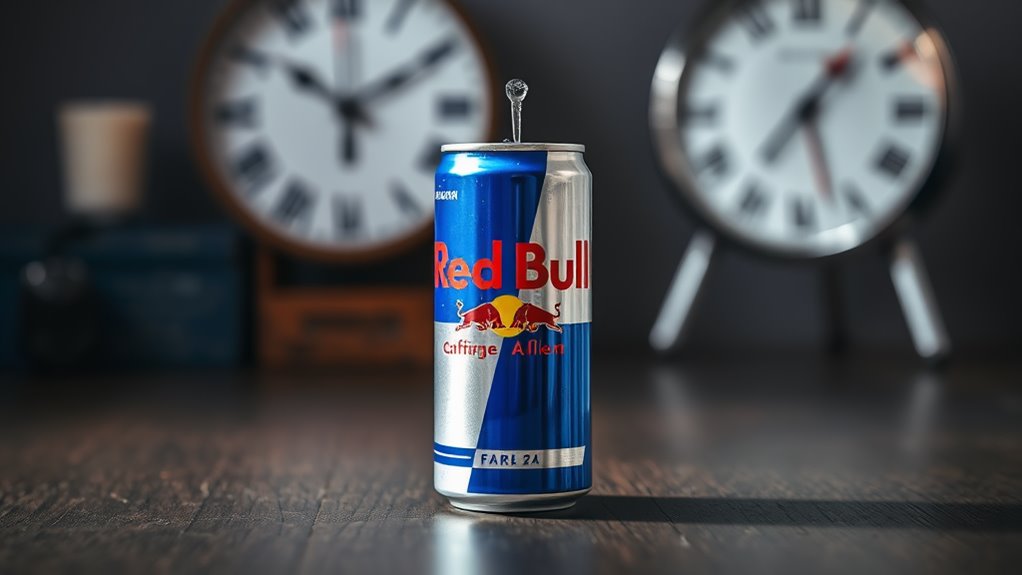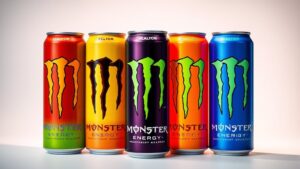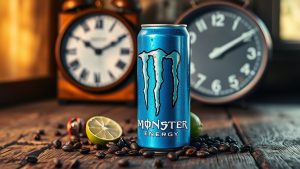Caffeine Content in Red Bull?
Not all energy drinks are created equal; discover how Red Bull’s caffeine content compares and what it means for your health.

An 8.4 oz can of Red Bull contains 80 mg of caffeine, which is similar to a small cup of coffee. This amount is lower than what you'll find in other energy drinks like Monster and Rockstar, which have around 160 mg in their larger cans. Keep in mind that high caffeine intake can lead to anxiety and sleep issues, especially if consumed later in the day. There's more to explore about the health implications and ingredients in energy drinks.
When you crack open an 8.4 oz can of Red Bull, you're consuming 80 mg of caffeine, which is roughly equivalent to a small cup of coffee. This caffeine level is lower compared to many other energy drinks on the market, like Monster Energy or Rockstar, both of which pack 160 mg of caffeine in their 16 oz cans.
While Red Bull's caffeine content might seem moderate, it's important to understand how it fits into your overall consumption, especially if you regularly consume other caffeinated beverages. Caffeine effects include increased alertness and wakefulness, but moderation is key to avoid negative side effects from energy drinks.
Understanding Red Bull's caffeine content is crucial, especially if you regularly consume other caffeinated beverages.
Beyond caffeine, Red Bull contains additional ingredients like taurine and sugar, which aren't present in coffee. The inclusion of these components contributes to the drink's unique energy-boosting effects.
However, the sugar content isn't negligible; an 8.4 oz can contains 27 grams of sugar, raising concerns about dental health and metabolic risks, particularly if you're consuming multiple cans throughout the day.
While Red Bull is a popular choice for those seeking a quick energy boost, it's important to recognize that high caffeine intake may lead to side effects such as anxiety and insomnia. The combination of caffeine and sugar can compound these risks, especially when consumed regularly.
Research has shown that energy drinks like Red Bull may even increase the risk of serious cardiovascular events, including atrial fibrillation. This is particularly concerning for individuals with pre-existing health conditions, and it's advisable to approach such drinks with caution.
Caffeine's effects on sleep patterns can also be significant. Consuming Red Bull, especially close to bedtime, can disrupt your sleep by making it harder to fall asleep or stay asleep.
The lasting effects of caffeine can linger for hours, so if you're sensitive to its effects, you might want to limit your consumption of Red Bull to earlier in the day. The high sugar content can further degrade sleep quality, making it even more challenging to rest well.
If you're considering making Red Bull a regular part of your routine, moderation is key. Daily consumption may lead to long-term health issues, particularly due to its high sugar and caffeine content.
While it can provide a temporary boost in energy, adverse effects like jitteriness and nausea can occur from excessive intake. Pregnant women, in particular, should limit or avoid energy drinks like Red Bull due to potential risks.
Conclusion
In summary, understanding the caffeine content in Red Bull is essential for making informed choices about your energy intake. With about 80 mg of caffeine per 8.4 oz can, it's important to take into account how this compares to a standard cup of coffee. Just as Icarus learned the peril of excess, moderation is key. By being mindful of your consumption, you can enjoy the boost without risking the crash, ensuring you stay energized and alert throughout your day.








